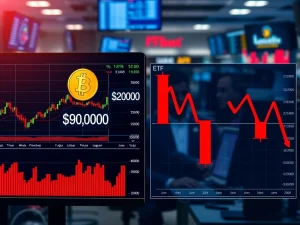Scandalous $45M Bitcoin Donation Rocks Czech Government, No-Confidence Vote Fails

A major political storm recently hit the Czech Republic, centered around a significant Bitcoin donation. The Czech government, led by Prime Minister Petr Fiala’s Civic Democratic Party, successfully fended off a no-confidence vote. This challenge, the fourth in three years, was primarily fueled by a controversial $45 million Bitcoin scandal that has captured public attention.
Understanding the Shocking Bitcoin Scandal
At the heart of the political turmoil is a substantial crypto donation made to the Czech Ministry of Justice. On May 27, a 1 billion Czech koruna, equivalent to about $45 million, Bitcoin donation was received. The donor was identified as Tomáš Jiřikovský, an individual with a history of convictions for drug trafficking, weapons offenses, and embezzlement. This connection immediately raised red flags and triggered concerns among opposition parties.
The origin of the donated Bitcoin is linked to Jiřikovský’s previously seized devices, returned following a court ruling. He reportedly offered approximately a third of the Bitcoin held in one of his wallets, amounting to 1,561 BTC. However, questions remain about a larger stash of over 3,800 Bitcoin reportedly tied to the illicit Nucleus Market website, which technical experts say is currently inaccessible due to being stored on older technology.
The Political Fallout: A Crucial No-Confidence Vote
The revelation of the $45 million crypto donation from a convicted criminal prompted opposition parties – ANO, SPD, and the Pirates – to call for a no-confidence vote against the government. They argued that the incident highlighted potential ethical lapses and a failure of oversight within the administration.
After more than 24 hours of intense debate in Parliament, the vote took place. The motion received 94 votes in favor, falling short of the 101 votes required to pass. While the Czech government survived this challenge, the debate exposed deep divisions and highlighted the opposition’s concerns regarding the handling of the Bitcoin scandal and government integrity.
Government Response and Calls for Accountability
Prime Minister Petr Fiala acknowledged the controversy surrounding the crypto donation, admitting that mistakes were made and that the incident had damaged public confidence. He stated that his party would “take responsibility for ethical misconduct.” However, he also accused the opposition of using the debate to spread misinformation and attack his government.
The scandal has already led to consequences. Former Justice Minister Pavel Blažek resigned on May 30, just days after the donation became public. Finance Minister Zbyněk Stanjura is also facing pressure, with claims that he had prior knowledge of the donation. The newly appointed Justice Minister, Eva Decroix, sworn in on June 10, has pledged to address the issue directly. She has promised to order an independent probe into the Ministry of Justice’s handling of the donation case and has stated her ministry will cooperate fully with the investigation.
Broader Implications: Crypto and Political Ethics
This incident in the Czech Republic adds to a growing list of controversies worldwide involving government officials and crypto-related activities. Concerns are rising about the potential for conflicts of interest and the need for clearer regulations regarding how politicians and government bodies interact with cryptocurrencies. Examples cited include US President Donald Trump’s involvement in various crypto ventures and Argentine President Javier Milei’s past association with the Libra token scandal. The Czech Bitcoin scandal underscores the complex ethical and legal challenges that arise when digital assets intersect with public office, particularly when linked to individuals with criminal backgrounds.
Summary
The Czech government has weathered a significant political challenge stemming from a controversial $45 million Bitcoin donation tied to a convicted criminal. While the no-confidence vote failed, the incident has prompted ministerial resignations and a promise of an independent investigation. This scandal highlights the increasing intersection of cryptocurrency with politics and the growing demand for transparency and accountability in how governments handle digital assets, especially when their origins are questionable. The outcome of the promised probe will be crucial in addressing public confidence and potentially shaping future regulations.










